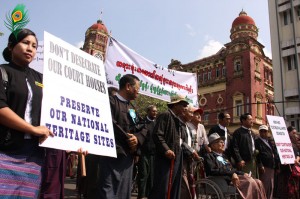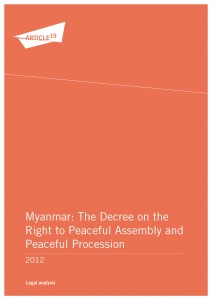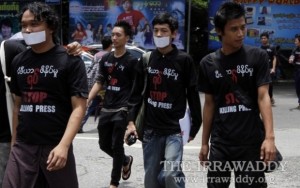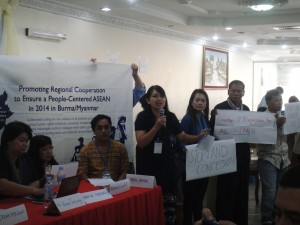Posts Tagged ‘Freedom of Expression’ (113 found)
No More Than a Semblance of Freedom of Assembly, Association and Expression
 Like many of Burma’s other reforms including the easing of restrictions on media, there is a darker side to the semblance of freedom of assembly, association and expression that has recently been commended in Burma.
Like many of Burma’s other reforms including the easing of restrictions on media, there is a darker side to the semblance of freedom of assembly, association and expression that has recently been commended in Burma.
President Thein Sein’s office has been urging ministries to remove some 4,000 people remaining on the blacklist. However, some returning exiles have been asked to sign agreements that they will not do anything that could “harm the state.” The agreement says that exiles can repay the government’s “generosity” by avoiding actions that would disrespect the government and not participate in actions or publish anything that would harm the country’s stability, which hark back to language used by the military regime.
Within the country, lawyers, activists, farmers and local villagers have been protesting on a range of crucial issues including land confiscation, mining projects, electricity shortages, the preservation of cultural heritage buildings in Rangoon and the need for nationwide peace. Those who speak out on issues that are sensitive to the government are detained, charged or threatened by authorities. One of the biggest cases at the moment is that of the thirteen organizers of the peace protest on 21 September who are facing court cases in 10 different Rangoon townships for protesting without permission. They are required to appear at court hearings nearly every day and must inform the authorities if they plan to leave Rangoon […]
Freedom on the Net 2012
While the military junta that ruled Burma for decades was interested in expanding information and communication technologies (ICTs) for business and propaganda purposes, it also made aggressive attempts to restrict access to digital media and control online content. Elections in November 2010 changed this dynamic […]
• • •The Decree on the Right to Peaceful Assembly and Peaceful Procession
 The Decree on the Right to Peaceful Assembly and Peaceful Procession is one of the first laws governing civil and political rights to be adopted since the election of a quasi-civilian government in November 2010. ARTICLE 19’s analysis of the law finds the law to be inconsistent with the right to freedom of expression and the right to assembly.
The Decree on the Right to Peaceful Assembly and Peaceful Procession is one of the first laws governing civil and political rights to be adopted since the election of a quasi-civilian government in November 2010. ARTICLE 19’s analysis of the law finds the law to be inconsistent with the right to freedom of expression and the right to assembly.
In the analysis, ARTICLE 19 appreciates the Decree’s recognition of the state’s duty to protect assembly participants. However, the requirement for permission to hold an assembly, the grounds for denying permission, the lack of a court appeal and the absence of guarantees for media access to assemblies are problematic and must be urgently revised […]
Burma Ends Pre-Publication Check, Not Censorship
 Prior submission of print media content that had been imposed for the last 48 years ended when the Press Scrutiny and Registration Board (PSRD) introduced its post-publication checks that came effective on 20 August. Journals and newspapers no longer need to submit their publication beforehand but afterward. However, the 1962 Printers and Publishers Registration Act and the 2004 Electronics Transaction Act that have been repeatedly used to jail journalists and activists are still in place. Journals have been suspended and could still be suspended at any time. Furthermore, journalists and reporters have to abide by the newly introduced 16-point ethical guidelines that prohibit them from criticizing the state.
Prior submission of print media content that had been imposed for the last 48 years ended when the Press Scrutiny and Registration Board (PSRD) introduced its post-publication checks that came effective on 20 August. Journals and newspapers no longer need to submit their publication beforehand but afterward. However, the 1962 Printers and Publishers Registration Act and the 2004 Electronics Transaction Act that have been repeatedly used to jail journalists and activists are still in place. Journals have been suspended and could still be suspended at any time. Furthermore, journalists and reporters have to abide by the newly introduced 16-point ethical guidelines that prohibit them from criticizing the state.
These repressive laws as well as the arbitrary regulations and code of conduct imposed on media and journalists remain a great threat to media freedom. The PSRD still monitors the content of publications and any newspaper or journal risks prosecution if any of their content breaks the guidelines. This has the very real potential of resulting in greater self-censorship […]
• • •HRWG Calls for AICHR to Adopt Human Rights on the Internet
Human Rights Working Group (HRWG) calls for ASEAN Inter-governmental Commission on Human Rights (AICHR) to adopt the promotion, protection and enjoyment of human rights on the internet access in ASEAN Human Rights Declaration (AHRD). HRWG has sent the submission to H.E. Om Yentieng, Chairperson of AICHR on July 27, 2012 […]
• • •10 Most Censored Countries
Shutting out international media and imposing dictatorial controls on domestic coverage, the Horn of Africa nation of Eritrea has emerged as the world’s most censored country, the Committee to Protect Journalists has found in its newly updated analysis of press restrictions around […]
• • •Analysis of the Guarantees of Freedom of Expression in the 2008 Constitution of the Republic of the Union of Myanmar
When it was first introduced in 2008, the new Constitution of the Republic of the Union of Myanmar was deemed to be a great improvement over the previous constitution. An important part of this was the more robust guarantees it included for human rights. And an important part of the latter was its relatively strong guarantees for freedom of expression.
At the same time, the guarantees for freedom of expression in the 2008 Constitution do not fully meet international standards in this area. This Analysis outlines the key attributes of international standards, and indicate how the guarantees of freedom of expression in the 2008 Constitution fail to meet these standards […]
• • •World Press Freedom Day, Not Yet a Day of Celebration for Burma’s Journalists
This week, on 3 May, the world will celebrate World Press Freedom Day, giving the occasion to look closely at recent developments that appear on the surface to be an easing of media restrictions in Burma.
This year, the Press Scrutiny and Registration Division (PSRD) exempted publications covering the themes of health, kids, technology, crime, education and sports from pre-publication censorship. Despite this, a recent International Media Support report found that Burma’s censorship board still orders the removal of approximately 20 to 25% of articles submitted by newspapers and magazines.
For instance, while massive presence of international media was allowed inside Burma at the time of the by-elections, local media were facing harsh restrictions. The International Press Institute reported that ahead of the elections, the PSRD issued a list of “Do’s and don’ts for the media covering the by-elections.” A local reporter explained that the PSRD warned editors that “action will be taken” against publications that don’t abide by the board’s guidelines […]
• • •Cambodia Curtails Freedom of Expression at ASEAN Civil Society Conference
 Four workshops organized by civil society organizations were forced late last night to move their workshops to La Palaranda hotel, away from the main venue of the ASEAN Civil Society Conference (ACSC)/ASEAN People’s Forum (APF), the Lucky Star Hotel (on Street 336, Phnom Penh). Three of the workshops dealt with land rights, eviction and environment issues and the fourth focused on Burma’s current political and human rights situation and the challenges this poses to the country’s chairmanship of ASEAN in 2014 […]
Four workshops organized by civil society organizations were forced late last night to move their workshops to La Palaranda hotel, away from the main venue of the ASEAN Civil Society Conference (ACSC)/ASEAN People’s Forum (APF), the Lucky Star Hotel (on Street 336, Phnom Penh). Three of the workshops dealt with land rights, eviction and environment issues and the fourth focused on Burma’s current political and human rights situation and the challenges this poses to the country’s chairmanship of ASEAN in 2014 […]
Burma’s New Media Law May Fail to Ensure Press Freedom
The International Federation of Journalists (IFJ) joins the Burma Media Association (BMA) in its concerns that Burma’s proposed new media law may not guarantee freedom of media as the government promised […]
• • •








 All posts
All posts